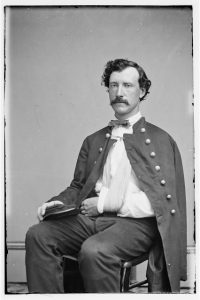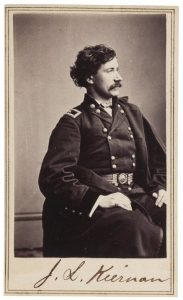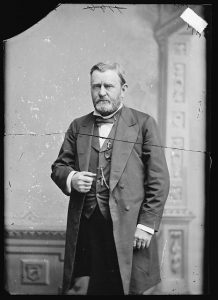The Rise and Fall of Brig. Gen. James L. Kiernan
Major James Lawlor Kiernan’s swift rise from major to brigadier general in August 1863 was just as remarkable as when Elon J. Farnsworth, George A. Custer, and Wesley Merritt were famously promoted from captains to brigadier generals on the eve of the Battle of Gettysburg. Kiernan was 25 years old at the time of his promotion, only two years older than the “Boy General” George A. Custer, and equally as daring. The three cavalry officers were promoted on the recommendation of Major General Alfred Pleasonton, while Kiernan was recommended for promotion by Major General Ulysses S. Grant and twenty-five other officers. Kiernan fell as quickly as he rose; he died poor and forgotten only six years after earning his star from President Abraham Lincoln.
James Kiernan, the son of a British Navy surgeon, was born on October 26, 1837, in the Irish town of Mountbellew. He was a descendant of Major Daniel Houghton (on his mother’s side), a British army officer and explorer who died while on his way to Timbuktu.
Not much is known about his youth, but he studied at Trinity College in Dublin. After graduation, he migrated to the United States and enrolled in the New York University Academy of Medicine. Dr. Valentine Mott, a well-known surgeon and university professor, said Kiernan was his favorite student. He graduated from the academy on March 4, 1857, at the age of 19. After obtaining his medical degree, he practiced medicine and served as co-editor of the weekly journal The New Medical Press. A gifted orator, he gave the valedictory address on the anniversary of the founding of his alma mater on February 25, 1861.
When civil war broke out in April 1861, Kiernan volunteered as an assistant surgeon with Colonel Michael Corcoran’s 69th New York and saw service at the Battle of Bull Run. After the regiment was mustered out, he traveled west and served for a short time on the staff of Major General John C. Frémont until the Pathfinder was relieved of his command. Kiernan was commissioned a surgeon with the rank of major in Colonel Clark Wright’s 6th Missouri Cavalry in early March 1862. He saw action during the Pea Ridge Campaign and was wounded in the right leg above the ankle by a Confederate musket ball.
Kiernan returned to his regiment after his recovery in time to take part in Grant’s Vicksburg Campaign, and fought his second, and last, battle in April 1863. During a skirmish outside of Port Gibson, Mississippi, Kiernan was shot in the left shoulder and chest, the second bullet piercing his left lung. The severely wounded surgeon was carried to the city’s hotel by his fellow troopers but fell into enemy hands when Wright’s men abandoned the city. His wounds were treated by a sympathetic Confederate surgeon and he was offered parole, but he refused it.

Days after being wounded and captured, Kiernan heard two Confederates chatting through an open window about plans to ambush a large supply train leaving Grand Gulf the next evening. That night, Kiernan dressed into his clothes and planned his escape. He snuck out of the back door of the hotel and tried to gain as much ground as he could before daybreak.
He relied on information gained from a black man to point him in the direction of Grand Gulf. When he reached Bayou Pierre, he found a log and used a stick to paddle his way across. Soaking wet, tired, and weak from his wounds, he stumbled into the Union picket line at Grand Gulf after journeying eight miles and warned them of the ambush.
For this daring act, Kiernan’s superiors recommended that he be promoted to brigadier general. The recommendation was forwarded to President Abraham Lincoln on April 13, 1863:
The undersigned officers of the United States Army would most respectfully recommend Major James L. Kiernan to His Excellency the President of the United States for promotion. After having been surgeon in the Army for two years, performed the most varied and active service, and done his duty with activity and zeal, he is about to retire from the medical department in order to enter the line. We respectfully trust that the President, taking into consideration his service and our recommendation, will consider his case favorably…In view of the meritorious services of this gallant officer, we earnestly recommend the passage of this bill.
The recommendation was signed by twenty-six officers, including Generals Ulysses S. Grant, Frank P. Blair, John A. McClernand, Alvin P. Hovey, Stephen A. Hurlbut, John M. Schofield, John F. Hartranft, John C. Sullivan, Peter J. Osterhaus, John A. Logan, James B. McPherson, Andrew J. Smith, and Stephen G. Burbridge.
Kiernan meanwhile returned home to New York that summer to recover from his wounds. According to a contemporary newspaper report, he helped to restore order in July 1863 during the New York Riots and received the “thanks of the commanding officers” for rendering “valuable service.”
On August 1, 1863, President Lincoln promoted the 25-year-old Irishman to brigadier general. When healed, Kiernan reported to Adjutant General Lorenzo Thomas in Vicksburg. Thomas stated that he arrived in good health. But he contracted malaria at Milliken’s Bend shortly after and was granted a leave of absence in November. He resigned on February 3, 1864, without having proved his mettle as a brigadier general in battle.

The Irishman arrived in Washington, D.C. a month later with a letter from Jesse K. Dubois of Springfield, Illinois, addressed to President Lincoln:
This will be handed to you by my young friend Brig Genl Keinan [sic]—I know that you feel a lively interest in the fate and good fame of all the brave and loyal men who have been engaged in crushing this abominable slavery rebellion. Genl Keinan [sic], comes to us endorsed by his many noble and daring deeds, and with the highest evidences of the esteem in which he has been held by every Genl and Corps Commander whom he has ever been with. I desire both, personally and because it is right of itself that whilst he is in Washington you will give him a patient free and fair hearing and mete out to him full justice such as I think he is entitled to receive at the hands of a great and magnanimous Government.
What injustice Kiernan felt he had suffered is unclear, but it was likely because his appointment as brigadier general had not been confirmed.
At some point during the interview with Lincoln, Kiernan made a promise to turn thousands of Irish-American Copperheads “into good union men.” He was a Democrat but assured Lincoln he would put his oratory skills to work and garner thousands of Irish votes from these anti-war Democrats. Some accused Kiernan of being no better than a modern-day Judas for betraying his political party, but he defended his conduct by stating that “as a true Union citizen desiring restored nationality, prosperity and power” he could never vote for George B. McClellan in the 1864 presidential election.
Kiernan called on Lincoln a second time in June 1864 to discuss his appointment as brigadier general not being confirmed. Secretary of War Edwin Stanton had apparently refused to sign off on Kiernan’s appointment (a crucial step in the process to be confirmed). Disgruntled, Kiernan wrote to Lincoln on June 28:
Your Excellency,
In reply to part of your endorsement to my application for re appointment as Brig Gen Vol, I have but to state, most respectfully, that I have commanded troops as Major of Cav and as Brig Gen, that I was in several battles in a fighting capacity and that one sabre cut and six bullet wounds on my person, are evidences of my services. I regret that the Sec of War received an ex-parte statement in my case and peremptorily declined any investigation.
If Your Excellency had time to examine my record, you might find it as bright and useful as any in the service.
Gen Grant gave his judgment of me, in a written address to your Excellency a year ago; I handed you the paper & possess it still, it being returned to me.
I retire into private life disabled & poor, but when I am wanted again in any capacity Your Excellency may choose, I am ready.
I have the honor to be
Very respectfully
Your Excellencies obt Srvt
James L Kiernan
Despite his passionate letter, Kiernan was not confirmed and sat out the rest of the war.
Three months after the war ended, President Andrew Johnson nominated Kiernan as U.S. Consul to Chinkiang on July 10. Mr. and Mrs. Kiernan left New York in December (He married before departing) as passengers on the steamer N.B. Palmer. They reached Hong Kong after an arduous 149-day voyage at sea. He remained in this position for only nine months due to poor health and returned to the United States. He embarrassingly had to borrow $1,300 from a few large American firms in China to cover his travel expenses back to New York.

When Ulysses S. Grant ran as a Republican candidate for president in 1868, Kiernan abandoned the Democratic Party for the second time and favored his old chief. For his loyalty, he requested a diplomatic appointment from Grant. Kiernan wrote to him on March 13, 1869:
I held high positions in New York before the war. I gave them up to enter the army; I served in the army faithfully and was repeatedly wounded; I also served in civil life, canvassing in many States for the Union cause from 1864 to 1869. I have impoverished myself in my fight, military and civil, for the Union. I ask the position of U. S. minister to Portugal or Turkey which I consider I deserve by my merits in the Union cause and which I am adapted for by education and experience as U. S Consul.
This time Grant did not endorse him as he had in 1863. Kiernan had earned a reputation for being pugnacious and an ineffective diplomat. He was also suspected of being a drinker. Kiernan wrote to Secretary of State Hamilton Fish on April 17 defending himself against these accusations: “Senator Wilson informs me that some party impressed you with the idea that I ‘drank’; I pronounce this statement made to you by ‘some party,’ either ignorantly or maliciously, utterly false and I must state that my whole life disproves it.” These allegations of alcoholism may or may not have influenced Grant’s decision, but he appointed two other men to fill these positions instead of Kiernan.

Tragically, Kiernan died seven months later at the age of 32 years old from “congestion of lungs” caused by his old Port Gibson wound. The Chicago Tribune published an obituary on his death in December: “Thus another brave and bright spirit is called away from loving wife, children, and fond friends in early manhood…In appearance, General Kiernan was the very beau ideal of a dashing cavalry officer. Gifted by nature with a [?] personal appearance; of a frank, open, gay, and happy nature; generous almost to a fault, he was beloved by his brother officers and the men of his command. Full of generous impulses himself, he could not brook anything mean in another.” It was a dismal end for a man that seemed destined from great things on and off the battlefield.
Bibliography
Newspapers
Chicago Tribune, December 2, 1869.
Cleveland Morning Leader, September 21, 1864.
Cleveland Morning Leader, September 29, 1864.
Daily Ohio Statesman (Columbus, Ohio), November 8, 1864.
The Evansville Journal (Evansville, Indiana), October 7, 1868.
The Evansville Journal (Evansville, Indiana), June 4, 1867.
The Evening Telegraph (Philadelphia, Pennsylvania), November 29, 1869.
The London and China Telegraph, January 17, 1870.
The New York Herald, December 28, 1869.
The New York Herald, May 8, 1867.
Books and Manuscripts
Congressional Serial Set. 54th Congress, 1st Session. Washington, D.C.: U.S. Government Printing Office, 1896.
Douglas, J.H., ed. American Medical Monthly, and New York Review, January-June, 1861. Volume 15. New York, 1861.
Eicher, John H. and David J. Eicher. Civil War High Commands. Stanford, CA: Stanford University Press, 2001.
General Alumni Catalogue of New York University, 1833-1907. New York: General Alumni Society, 1908.
Grant, Ulysses S. The Papers of Ulysses S. Grant, Volume 25, 1874. Edited by John Y. Simon. Carbondale: Southern Louisiana Press, 2003.
Kelsey, D. M. Deeds of Daring by the American Soldier, North and South. New York: The Werner Company, 1897.
Lincoln, Abraham. James L. Kiernan to Abraham Lincoln, May 25, 1864. Letter. From Library of Congress, Abraham Lincoln Papers: Series 1. General Correspondence. 1833-1916. https://www.loc.gov/item/mal1618400/ (accessed August 14, 2018).
Lincoln, Abraham. James L. Kiernan to Abraham Lincoln, June 28, 1864. Letter. From Library of Congress, Abraham Lincoln Papers: Series 1. General Correspondence. 1833-1916. https://www.loc.gov/item/mal3408800/ (accessed August 14, 2018).
Lincoln, Abraham. Jesse K. Dubois to Abraham Lincoln, March 14, 1864. Letter. From Library of Congress, Abraham Lincoln Papers: Series 1. General Correspondence. 1833-1916. https://www.loc.gov/item/mal3155500/ (accessed August 14, 2018).
Moore, Frank, ed. The Rebellion Record: A Diary of American Events. Volume 7. New York: D. Van Nostrand, Publisher, 1864.
Official Register of Missouri Troops for 1862: St. Louis, MO: Adjutant General’s Office, 1863.
Steiner, Paul E. Physician-Generals of the Civil War: A Study in Nineteenth Mid-Century American Medicine. Springfield, Ill: Charles C. Thomas, 1966.
The Nation: A Weekly Journal Devoted to Politics, Literature, Science, and Art. From January 1 to June 30, 1870. Volume 10. New York: E.L. Godkin & Co., Publishers, 1870.
The War of the Rebellion: A Compilation of the Official Records of the Union and Confederate Armies. Series III-Volume III. Washington: Government Printing Office, 1899.
Transactions of the American Medical Association. Vol. 21. Philadelphia: Collins, Printer, 1870.
Warner, Ezra. Generals in Blue: Lives of the Union Commanders. Baton Rouge: Louisiana State University Press, 1964.
Welsh, Jack D. Medical Histories of Union Generals. Kent, OH: Kent State University Press, 1996.
Wilson, James G. and John Fiske. Appleton’s Cyclopaedia of American Biography. Vol. III. Grinnell-Lockwood. New York: D. Appleton & Company, 1898.
Fascinating account. Thanks for enlightening us. Another great example of showing the human side of the Civil War.
This is a very well researched article which showed how happenstance is the attainment of position and fame.
Quite a story and an impressive array of references! Thanks for bringing Kiernan’s story to light. The reading I’ve done about Civil War medical personnel focused on their struggles, accomplishments and failures treating the wounds and diseases that killed so many on both sides. I had not read, until today, any accounts of physicians carrying weapons and going into battle going into battle “in a fighting capacity,” as stated in Kiernan’s June 28 letter to Lincoln that you excerpted. I knew there were “Chaplains Militant,” such as the U.S. Sharpshooter’s Methodist minister, Lorenzo Barber. Were there “Surgeons Militant” too?
Thank you! Not that I am aware of. I think Kiernan may have been the exception. Steiner’s “Physician-Generals of the Civil War” is a great reference for physicians that served in the war.
Thanks for your reply. I re-read the part in your piece about Kiernan and how he “saw action during the Pea Ridge Campaign and was wounded in the right leg…” Is it possible he was just in the wrong place at the wrong time when the Confederates opened up, not riding in an attack with his cavalry unit? That’s certainly plausible.
Robert Denney has excerpts from a lot of military doctors’ war letters in “Civil War Medicine” that I just pulled off the shelf and glanced at. One of the first letters I encountered, about the fighting near Williamsburg VA on May 5, tells such a story. The hospital steward who wrote the letter, unaware that the Confederates were nearby, was about to drink a cup of tea in a house they had occupied when “the bullets began to fall around us.” He was not wounded, but he wrote “Doctor Post was hit on the head…”
That is a good question, Rob. I wish I had the answer. Information related to Kiernan’s service during the Pea Ridge Campaign is sketchy. Some sources say he was wounded at the actual Battle of Pea Ridge, but I wasn’t able to find any record of him being wounded there. I was hoping to locate more information on how and when he was wounded there. The same goes for his wounding at Port Gibson. Kiernan still remains somewhat of a mystery to me and his service record warrants further research.
Thanks. I dodn’t mean to belabor this point, but researching for an article about “chaplains militant” who did go into battle got me interested in non-combatant status during the Civil War. Did it exist? From what I read, there was no official policy designating chaplains non-combatants and establishing their position during combat, and some did fight and were recognized for their prowess and bravery on the battlefield. (Today’s US military regulations are clear that they should be non-combatants.) Maybe CW medical personnel had the option to fight too, although their skills would seem better suited for saving lives not taking them!
Anyway, your article got me interested in these doctors and I did some light Google research. This from Civil War Home (civilwarhome.com/armysurgeon.html): “…the record of the casualties among the regular and volunteer Federal medical officers during the Civil War is of interest. Thirty-two were killed in battle or by guerillas; nine died by accident; eighty-three were wounded in action, of whom ten died…”
The article did not say whether or not the guys “in action” were fighting on the battlefield or just performing their medical duties there when an artillery barrage or sharpshooters bullet came their way. So the mystery is not yet solved. I’ll let you know if I find the answer.